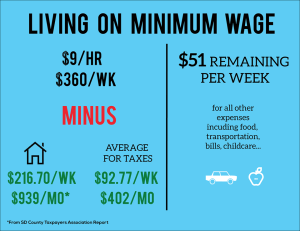 By Todd Gloria / President, San Diego City Council
By Todd Gloria / President, San Diego City Council
My morning ritual on most days is to buy a cup of my favorite coffee in Hillcrest. This week I did not do that. I couldn’t because I was trying to live on the minimum wage. After paying for housing and taxes, I had $51 left to spend on all my expenses including food and transportation. This meant carefully considering how to spend every penny, and I couldn’t afford my morning coffee.
My reduced consumption wasn’t limited to coffee. I knew this challenge would require a drastic reduction in what I was able to contribute to the local economy. I didn’t eat out this week. I didn’t dry clean my clothes. I skipped washing my car. The businesses that I did patronize saw far less of my money than they would in an average week.
 As I struggled to live on $51 for one week, I didn’t lose sight of the fact that this is just an experiment for me. For thousands of San Diegans, roughly 38% of us, this is their life every single day.
As I struggled to live on $51 for one week, I didn’t lose sight of the fact that this is just an experiment for me. For thousands of San Diegans, roughly 38% of us, this is their life every single day.
Those who want to repeal San Diego’s minimum wage claim that raising wages will do great harm to local businesses. The truth is that reducing consumption because of obscenely low wages does a great deal of harm for our economy and workers as well.
When I ran out of razors this week, it was cause for panic. I know razors are an expensive toiletry, but I’ve never considered them to be a luxury. It gave me a far better understanding of the stress and fear that is constantly present in minimum wage households. I had to make do with a dull razor for a few days, but I know that I have the capacity to spend money and buy more next week. That isn’t the case for 172,000 of my neighbors.
@MichaelSmolens Yes. #lunch #LiveTheWageSD #DontSignIt pic.twitter.com/NAqhM7rSua
— Todd Gloria (@ToddGloria) September 5, 2014
San Diego’s new minimum wage is expected to pump $260 million into our local economy. This comes from workers who would now be able to afford to buy the goods and services they need. They could now buy badly needed new shoes for their child. They might event be able to consider having an occasional meal at a local restaurant that is otherwise prohibited by their hourly wage. That could generate a lot of new customers for local businesses. The minimum wage opponents also make broad statements that suggest that low wage workers ought to work harder to get out of their present circumstances. Implicit in this advice is that belief that the poor are lazy and lack skills. Nothing is further from the truth. Just the constant budgeting to the penny to keep expenses in check demonstrates a skill I believe many San Diegans are fortunate enough to ignore during weekly grocery shopping. Being poor in San Diego requires you to work incredibly hard. It means getting up early to catch a bus to work. It often means working multiple jobs to make ends meet. It requires doing without necessities the rest of us couldn’t live without. It requires a resourcefulness that is impressive but ultimately exhausting. This grind rarely leaves anything left over to help a family get ahead. It doesn’t have to be this way.
Nickeled & dimed. With just $51/wk, spending $1 for air hurts. At least I don’t need a new tire. #LiveTheWageSD pic.twitter.com/sphboCpyFU — Todd Gloria (@ToddGloria) September 6, 2014
As the son of a hotel maid and a gardener, I grew up poor and I grew up witnessing that my parents’ hard work in low wage jobs led to better opportunities. I worry that my family’s story is less possible today. Over the years, the minimum wage hasn’t kept up with the cost of living. Simultaneously, the fastest growing sectors in our economy are predominantly low wage jobs like fast food, retail and some in the tourism sector. There are fewer opportunities to climb the economic ladder that leads to the middle class.
Those with money and power, some of whom are using both to stop our efforts to increase the minimum wage, seem to favor an economy that keeps low wage workers in low wage jobs. Hard working families are now expected to reduce their dreams for themselves and their families. It can’t stay this way. Our ordinance is a step toward reversing that.
The increase in the minimum wage and provision of paid sick days will give 279,000 San Diegans a fighting chance to get ahead. For these San Diegans, the challenge of living on minimum wage isn’t about getting through the day without their favorite coffee. It’s about putting food on the table and keeping a roof over their heads and allowing them to believe and work for better for themselves and their families.
Woman on the bus had two questions for me. #1. “What are you doing here?” #2. “Can we take a selfie?” #LiveTheWageSD #DontSignIt
— Todd Gloria (@ToddGloria) September 9, 2014
This is a repost from our online media partner, San Diego Free Press.







{ 2 comments… read them below or add one }
He speaks more for me than K. Faulconer EVER will, simply because he is prepared to put himself in other people’s shoes. Thank you T.G. for your willingness to dip your toes into many peoples day to day financial reality.
Living in min wage is hardest on those who spend 95% of their income on housing. Who does that?